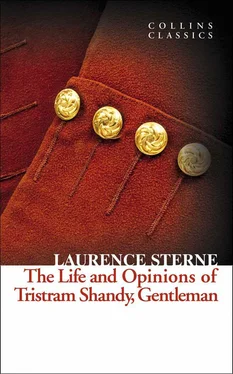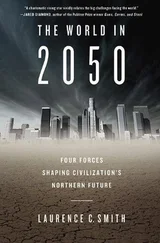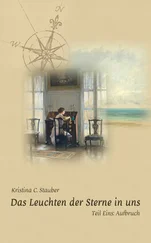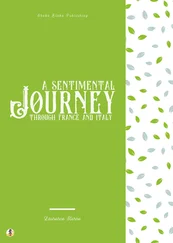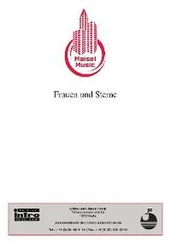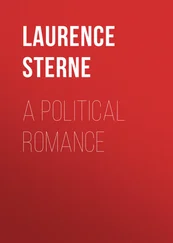If the fixture of Momus’s glass in the human breast, according to the proposed emendation of that arch-critick, had taken place,—first, This foolish consequence would certainly have followed,—That the very wisest and very gravest of us all, in one coin or other, must have paid window-money every day of our lives.
And, secondly, that had the said glass been there set up, nothing more would have been wanting, in order to have taken a man’s character, but to have taken a chair and gone softly, as you would to a dioptrical bee-hive, and look’d in,—view’d the soul stark naked;—observed all her motions,—her machinations;—traced all her maggots from their first engendering to their crawling forth;—watched her loose in her frisks, her gambols, her capricios; and after some notice of her more solemn deportment, consequent upon such frisks, &c.—then taken your pen and ink and set down nothing but what you had seen, and could have sworn to:—But this is an advantage not to be had by the biographer in this planet;—in the planet Mercury (belike) it may be so, if not better still for him;—for there the intense heat of the country, which is proved by computators, from its vicinity to the sun, to be more than equal to that of red-hot iron,—must, I think, long ago have vitrified the bodies of the inhabitants, (as the efficient cause) to suit them for the climate (which is the final cause;) so that betwixt them both, all the tenements of their souls, from top to bottom, may be nothing else, for aught the soundest philosophy can shew to the contrary, but one fine transparent body of clear glass (bating the umbilical knot)—so that, till the inhabitants grow old and tolerably wrinkled, whereby the rays of light, in passing through them, become so monstrously refracted,—or return reflected from their surfaces in such transverse lines to the eye, that a man cannot be seen through;—his soul might as well, unless for mere ceremony, or the trifling advantage which the umbilical point gave her,—might, upon all other accounts, I say, as well play the fool out o’doors as in her own house.
But this, as I said above, is not the case of the inhabitants of this earth;—our minds shine not through the body, but are wrapt up here in a dark covering of uncrystalized flesh and blood; so that, if we would come to the specific characters of them, we must go some other way to work.
Many, in good truth, are the ways, which human wit has been forced to take, to do this thing with exactness.
Some, for instance, draw all their characters with wind-instruments.—Virgil takes notice of that way in the affair of Dido and Aeneas;—but it is as fallacious as the breath of fame;—and, moreover, bespeaks a narrow genius. I am not ignorant that the Italians pretend to a mathematical exactness in their designations of one particular sort of character among them, from the forte or piano of a certain wind-instrument they use,—which they say is infallible.—I dare not mention the name of the instrument in this place;—’tis sufficient we have it amongst us,—but never think of making a drawing by it;—this is aenigmatical, and intended to be so, at least ad populum :—And therefore, I beg, Madam, when you come here, that you read on as fast as you can, and never stop to make any inquiry about it.
There are others again, who will draw a man’s character from no other helps in the world, but merely from his evacuations;—but this often gives a very incorrect outline,—unless, indeed, you take a sketch of his repletions too; and by correcting one drawing from the other, compound one good figure out of them both.
I should have no objection to this method, but that I think it must smell too strong of the lamp,—and be render’d still more operose, by forcing you to have an eye to the rest of his Non-naturals.—Why the most natural actions of a man’s life should be called his Non-naturals,—is another question.
There are others, fourthly, who disdain every one of these expedients;—not from any fertility of their own, but from the various ways of doing it, which they have borrowed from the honourable devices which the Pentagraphic Brethren (Pentagraph, an instrument to copy Prints and Pictures mechanically, and in any proportion.) of the brush have shewn in taking copies.—These, you must know, are your great historians.
One of these you will see drawing a full length character against the light;—that’s illiberal,—dishonest,—and hard upon the character of the man who sits.
Others, to mend the matter, will make a drawing of you in the Camera;—that is most unfair of all, because, there you are sure to be represented in some of your most ridiculous attitudes.
To avoid all and every one of these errors in giving you my uncle Toby’s character, I am determined to draw it by no mechanical help whatever;—nor shall my pencil be guided by any one wind-instrument which ever was blown upon, either on this, or on the other side of the Alps;—nor will I consider either his repletions or his discharges,—or touch upon his Non-naturals; but, in a word, I will draw my uncle Toby’s character from his Hobby-Horse.
If I was not morally sure that the reader must be out of all patience for my uncle Toby’s character,—I would here previously have convinced him that there is no instrument so fit to draw such a thing with, as that which I have pitch’d upon.
A man and his Hobby-Horse, tho’ I cannot say that they act and re-act exactly after the same manner in which the soul and body do upon each other: Yet doubtless there is a communication between them of some kind; and my opinion rather is, that there is something in it more of the manner of electrified bodies,—and that, by means of the heated parts of the rider, which come immediately into contact with the back of the Hobby-Horse,—by long journies and much friction, it so happens, that the body of the rider is at length fill’d as full of Hobby-Horsical matter as it can hold;—so that if you are able to give but a clear description of the nature of the one, you may form a pretty exact notion of the genius and character of the other.
Now the Hobby-Horse which my uncle Toby always rode upon, was in my opinion an Hobby-Horse well worth giving a description of, if it was only upon the score of his great singularity;—for you might have travelled from York to Dover,—from Dover to Penzance in Cornwall, and from Penzance to York back again, and not have seen such another upon the road; or if you had seen such a one, whatever haste you had been in, you must infallibly have stopp’d to have taken a view of him. Indeed, the gait and figure of him was so strange, and so utterly unlike was he, from his head to his tail, to any one of the whole species, that it was now and then made a matter of dispute,—whether he was really a Hobby-Horse or no: But as the Philosopher would use no other argument to the Sceptic, who disputed with him against the reality of motion, save that of rising up upon his legs, and walking across the room;—so would my uncle Toby use no other argument to prove his Hobby-Horse was a Hobby-Horse indeed, but by getting upon his back and riding him about;—leaving the world, after that, to determine the point as it thought fit.
In good truth, my uncle Toby mounted him with so much pleasure, and he carried my uncle Toby so well,—that he troubled his head very little with what the world either said or thought about it.
It is now high time, however, that I give you a description of him:—But to go on regularly, I only beg you will give me leave to acquaint you first, how my uncle Toby came by him.
The wound in my uncle Toby’s groin, which he received at the siege of Namur, rendering him unfit for the service, it was thought expedient he should return to England, in order, if possible, to be set to rights.
Читать дальше
